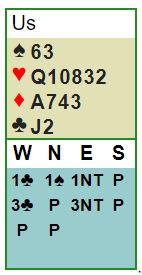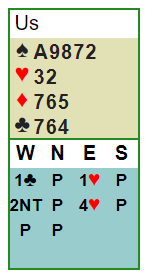
Not Leading Partner’s Suit
Opening leads become a lot easier with some help from partner. That’s why many players go out of their way to overcall a suit they want led, or to make a lead-directing double when the opportunity arises. However, it’s not uncommon that the player on lead has enough information to decide that another lead might be better. Here are two such situations. You hold 642
642  Q6
Q6  KT9543
KT9543  109. Neither side vul at matchpoints, LHO deals and opens 1
109. Neither side vul at matchpoints, LHO deals and opens 1 . Partner overcalls 1
. Partner overcalls 1 and RHO bids 1
and RHO bids 1 . You pass and LHO raises to 2
. You pass and LHO raises to 2 . RHO bids 3NT and LHO pulls to 4
. RHO bids 3NT and LHO pulls to 4 . Let’s consider what we know before making the “automatic” heart lead. RHO has something good in hearts, so leading the queen might give up a trick in the suit. For example, RHO might have KJx or AJx of hearts. Also, LHO chose spades over notrump, suggesting he expects to make tricks by ruffing something. We have a good diamond holding, which is a suit RHO might be expected to have strength in for his 3NT bid since his partner opened in clubs. If partner has some help in clubs then the opponents may have trouble finding 10 tricks. Our trumps are too small to suggest we will be ruffing hearts in front of dummy or overruffing clubs. There are no guarantees in a position like this, but I feel the signs point to a trump lead. Leading a heart might not only give up a trick in the suit, but lose a valuable tempo in the race to lead as many trumps as possible.
Often we have to choose between leading partner’s suit or our own. To generalize, the stronger our suit and hand is, and the shorter we are in partner’s suit, the more attractive leading our own suit becomes. Let’s say we hold the following hand and hear the auction proceed:
. Let’s consider what we know before making the “automatic” heart lead. RHO has something good in hearts, so leading the queen might give up a trick in the suit. For example, RHO might have KJx or AJx of hearts. Also, LHO chose spades over notrump, suggesting he expects to make tricks by ruffing something. We have a good diamond holding, which is a suit RHO might be expected to have strength in for his 3NT bid since his partner opened in clubs. If partner has some help in clubs then the opponents may have trouble finding 10 tricks. Our trumps are too small to suggest we will be ruffing hearts in front of dummy or overruffing clubs. There are no guarantees in a position like this, but I feel the signs point to a trump lead. Leading a heart might not only give up a trick in the suit, but lose a valuable tempo in the race to lead as many trumps as possible.
Often we have to choose between leading partner’s suit or our own. To generalize, the stronger our suit and hand is, and the shorter we are in partner’s suit, the more attractive leading our own suit becomes. Let’s say we hold the following hand and hear the auction proceed:

 10 with the
10 with the  6 (
6 ( T3
T3  Q8632
Q8632  A743
A743  J2) changes the odds. This heart suit is a lot less likely to run than the one with the ten, and we have something to contribute to partner’s spades. Now let’s change the hand again to
J2) changes the odds. This heart suit is a lot less likely to run than the one with the ten, and we have something to contribute to partner’s spades. Now let’s change the hand again to  3
3  Q8632
Q8632  A743
A743  JT2. I would go back to the heart lead. A small singleton is a bad holding opposite partner’s suit. Partner needs an excellent suit for that lead to be right, and your singleton makes it more likely that the opponents have more cards in partner’s suit. While partner might hold an excellent suit, I think it is against the odds.
JT2. I would go back to the heart lead. A small singleton is a bad holding opposite partner’s suit. Partner needs an excellent suit for that lead to be right, and your singleton makes it more likely that the opponents have more cards in partner’s suit. While partner might hold an excellent suit, I think it is against the odds.
Underleading Aces Against Suit Contracts
Less common than leading our own suit instead of partner’s is the underlead of an ace against suit contracts. This is generally a risky thing to do. Not only may a trick be lost outright, but partner may not even realize he should play the king if he has it. He should stay alert for when the conditions are right for an ace underlead, but he could still go wrong. That means we should choose our spots wisely. The typical situation occurs when the hand on our left showed strength, particularly in the suit we have bid. This time we hold:
False Carding on Lead
There are opportunities to intentionally violate your own lead agreements. You want to make sure you are doing it for a reason and not randomly, as partner will be fooled. One situation that makes sense for a falsecard on lead is when you have all the strength for your side. Suppose you hold A43
A43  84
84  Q75
Q75  AK642 and RHO opens 1NT, raised to 3NT on your left.
It’s easy to imagine what is happening. Partner is nearly broke, and declarer may make this hand by guessing the diamond queen. If you lead the AK and another club, declarer is likely to play you for the spade ace and thus rely on the diamond guess to make. Leading the
AK642 and RHO opens 1NT, raised to 3NT on your left.
It’s easy to imagine what is happening. Partner is nearly broke, and declarer may make this hand by guessing the diamond queen. If you lead the AK and another club, declarer is likely to play you for the spade ace and thus rely on the diamond guess to make. Leading the  2 (assuming fourth best leads) is a great way to fool declarer. He will now think that by giving up a spade he can make his contract since we will only have three clubs to take. And we also know that it won’t matter if partner is fooled since his hand is likely irrelevant.
There are also chances to lead an unusual honor card. I won’t give a specific hand, but suppose the opponents bid to a suit slam and you have decided to lead a side suit of Qxx. It may be worth considering leading the queen. You need partner to have something in the suit anyway, and you may mislead declarer into a failing line of play. For example, if partner has Jxx and the opponents’ honors are split then leading low gives up a trick for sure. Leading the queen forces declarer to guess whether you led from QJ or (from his perspective) a short suit, and he is likely to get it wrong. If partner has the king and your side has the other trick needed to set the contract, then it likely won’t matter whether you led the queen or low. Leading honors from empty suits is a situation that is hard to quantify and has a high variance, but it can show gains.
There won’t be a quiz this week, as this topic is very subjective and it’s difficult to come up with hands that offer a right and wrong answer beyond what I used in the article. I only scratched the surface of possibilities regarding unusual leads.
2 (assuming fourth best leads) is a great way to fool declarer. He will now think that by giving up a spade he can make his contract since we will only have three clubs to take. And we also know that it won’t matter if partner is fooled since his hand is likely irrelevant.
There are also chances to lead an unusual honor card. I won’t give a specific hand, but suppose the opponents bid to a suit slam and you have decided to lead a side suit of Qxx. It may be worth considering leading the queen. You need partner to have something in the suit anyway, and you may mislead declarer into a failing line of play. For example, if partner has Jxx and the opponents’ honors are split then leading low gives up a trick for sure. Leading the queen forces declarer to guess whether you led from QJ or (from his perspective) a short suit, and he is likely to get it wrong. If partner has the king and your side has the other trick needed to set the contract, then it likely won’t matter whether you led the queen or low. Leading honors from empty suits is a situation that is hard to quantify and has a high variance, but it can show gains.
There won’t be a quiz this week, as this topic is very subjective and it’s difficult to come up with hands that offer a right and wrong answer beyond what I used in the article. I only scratched the surface of possibilities regarding unusual leads.
Don’t forget to follow us @



























